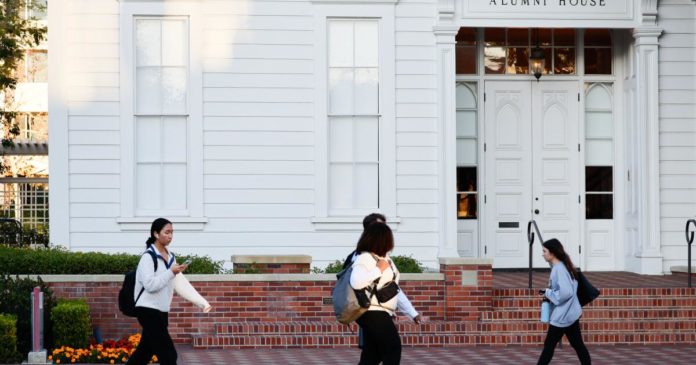A statue of a USC founder whose connection to groups that carried out extralegal lynchings raised questions about the statue’s placement was removed last month for routine maintenance, university officials said.
Judge Robert Widney was one of the USC’s founders, and since 2014 an 8-foot bronze statue of him had stood outside the Widney Alumni House.
In an instagram post, The Daily Trojan reported Widney’s statue and the plaque were taken down Nov. 28.
In an emailed statement, the university said the statue was removed for “maintenance and cleaning,” but did not answer a question on whether it will be returned.
Like many institutions, USC was met with reinvigorated calls to purge its namesake sites tied to racist figures, which included university founders, presidents and athletics coaches after a police officer murdered George Floyd on camera in 2020. The fury and protests over the killing strengthened a nationwide movement to remove symbols or names associated with racism in public spaces and on school campuses. Monuments, statues and buildings were toppled, dismantled or renamed as organizations, schools and cities reckoned with their pasts.
In June 2020, after years of demands for the university to take action, USC removed the Von KleinSmid Center for International and Public Affairs, which was named after Rufus B. von KleinSmid, the university’s fifth president.He was also a leading figure in California’s eugenics movement.
A bust of Von KleinSmid was also removed from campus after a unanimous vote from the board of trustees’ executive committee.
In 2021, the building was renamed in honor of Joseph Medicine Crow, a Native American alumnus who wrote influential works about Indigenous history and culture.
Over the summer, the university renamed its track and field in honor of athlete and alumna Allyson Felix, the most decorated American track and field athlete in Olympics history. The space had previously been named after Dean Cromwell, a former USC track coach who was criticized for anti-Black views and antisemitic actions.
But the statue of Widney had remained. According to USC, Widney is one of the four founding fathers of the school, and he had outsized influence on its growth in the late 1870s.
But Widney was also tied to the Home Guard Vigilance Committee in the late 1800s. At the time, vigilante groups in Los Angeles often targeted Native Americans and people of color, according to multiple historians.
A professor and historian at UC Merced told The Times in 2020 that Robert Widney was “most certainly” supportive of extralegal lynchings. Widney’s statue came under sharper scrutiny after the university stripped Von KleinSmid’s name from the landmark building.
Widney’s brother, Joseph Widney, was USC’s second president. He expressed racist views in his writing, including that Black and white people “cannot live together as equals.” Historian Torres-Rouff described the racial beliefs Joseph Widney espoused in his book as “repugnant,” citing them in a 2018 article asking universities “to confront their past, not omit it.”
Times staff writer Tomás Mier contributed to this report.


